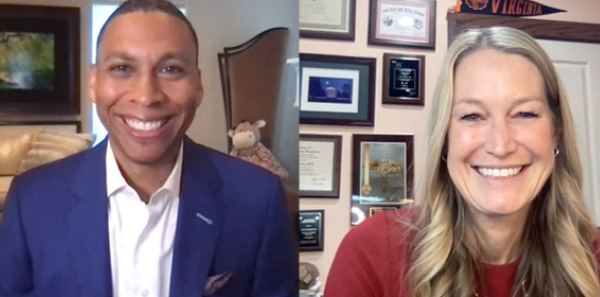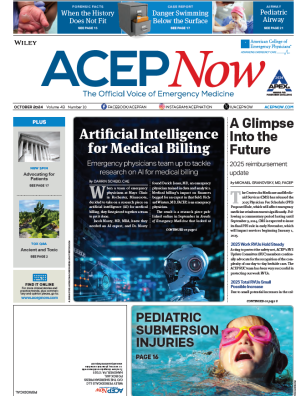
I had the opportunity to briefly see Gillian Schmitz, MD, FACEP, between meetings in Boston as she rode up the elevator at the conference hotel. Although we didn’t have a chance to speak for long at that moment, we sat down a few days after ACEP21 to discuss her plans as ACEP’s President. Below are excerpts from our conversation, which have been edited for length and clarity, and you can watch our entire interview here
Explore This Issue
ACEP Now: Vol 40 – No 12 – December 2021Cedric Dark: How’s the job going so far?
Gillian Schmitz: It has been a very busy couple weeks! I feel like it’s been going nonstop. We just got back from Boston, and it was very invigorating and exciting to be able to see everybody in person again. I’m hitting the ground running and really excited to get started.
CD: I remember seeing you in Boston in the elevator at the end of an extremely long day. How do you handle things like work-life balance, especially considering the fact that we, the ACEP members and the emergency medicine family, have asked so much of you over the past decade of your life?
GS: Work-life balance is so important for all emergency physicians. I’m a runner, and I’m also a tennis player. [Those hobbies] keep me grounded, but I think the support system I have within our community of emergency physicians and, most notably, my family and kids help ground me the most. Having time to unwind after work, get lost in a TV show or book, or just spend time with my friends and family gives me time to absorb it all and stay grounded.
CD: What’s something the average ACEP member might not know about you to help them understand you a little bit more as a leader in the College?
GS: I met my husband in medical school, sitting next to each other during orientation at a White Sox game. He had a military career, and because of his career, we’ve lived and practiced all over the country, so my career has been all over the place. I’ve done a lot of academic practice, but I’ve worked in some rural emergency departments, a freestanding emergency department, and started my own small democratic group. These have all given me perspective on how different our practices can be and in different resource environments.
CD: How do you intend to bridge that divide coming from all these different member perspectives?
GS: Unlike other specialties that lean one way or the other politically, emergency medicine is right down the middle. We are 50 percent Republican, 50 percent Democrat. Although we try to stick to medicine, a lot of what we do in emergency medicine has to do with public health, and there are gray areas. Half of the College wants us to take one action to be vocal and the other half has a very different opinion, and you can be very alienating of half of your membership no matter what you say or do. Our strategy has been that we are the American College of Emergency Physicians, not the Republican College or Democratic College.
CD: ACEP is looking at a strategic plan for the next several years. What will ACEP be doing over the next two to three years that might transform the organization and the specialty?
GS: We need to focus on the individual emergency physician. What I’m hearing from members is that we joined ACEP because we want someone to fight for us, to represent us and our needs. Our strategic pivot is going to be around how we best advocate for the emergency physician.
CD: Looking into that landscape, with the pandemic hopefully coming to an end, what do you think the value proposition is for ACEP?
GS: The sense of community that we have within ACEP and within the emergency medicine specialty is, for me, an opportunity to recharge my batteries of being around like-minded individuals, feeling a sense of home and of coming together with my colleagues. That’s one value of membership.
The second value involves the numerous resources and tools ACEP has for our members. Specific to COVID, we have a now nationally recognized COVID-19 Field Guide that has the most up-to-date information and best practices pertaining to emergency physicians. Beyond COVID, there are so many different resources on how to advance your career, how to get promoted, leadership opportunities in the publications and national committees. Those are all things that helped me advance my career that I wouldn’t have been able to do by myself as an individual.
The third value is advocacy, and this is what ACEP does better than anybody else, but many emergency physicians don’t really even understand what advocacy is. A lot of what ACEP does is prevent bad things from happening, and that’s a hard sell because many people don’t even see those bad things come to fruition because we had an active role in preventing them.
CD: There are some big issues that I think a lot of members are really concerned about, one of which is what happens with corporate medicine. What do you think the College’s role is in the management of our practices, and how do you think the average emergency physician can regain control of their livelihood?
GS: I think that’s a great question, and there has been this perception that ACEP is afraid to talk about it or that we’re in bed with CMGs [contract management groups]. I think this is really going to be a focal point of my presidency—starting to talk about it. But let’s talk about it with data and truth and not by innuendos and emotionally charged rhetoric that isn’t necessarily accurate. Because just like people spread rumors about the vaccine and ivermectin, we need to be able to have open discussions that are respectful and look at issues that have been very divisive within our specialty. If we look historically, when I graduated from residency, I had a choice of where I practiced and the practice model that I went into. Nowadays, my residents don’t have that choice.
We’ve seen such consolidation across the market, across the entire health care industry. Hospitals are now health systems. Insurance companies, where there used to be dozens and dozens of them, now there are three or four, and in many markets, there may be one. Physicians are more likely to be employed by either an employer or physician staffing group than they are to own their own practice, and because of that, we’ve become increasingly divorced from how we’re reimbursed. My perception is that most emergency physicians have a very negative view of the corporatization of emergency medicine, and I think we have to acknowledge that.
What’s important for our members to understand is that the corporatization of medicine is not just large corporate groups. This is happening in academic practices. It’s happening in small democratic groups. This happened in the military, where we have people in the C-suite, administrators, nurse officers telling us how to do our jobs, and it’s incredibly frustrating to feel that you have lost control over your practice. How do we empower physicians to have that ability to control their practice?
CD: What do you think the leadership of ACEP is doing in regard to the role of nonphysicians in emergency medicine?
GS: ACEP has always advocated for emergency physician–led care. We are vehemently fighting against independent practice, and it’s been very concerning, particularly in the midst of COVID, the amount of states that have tried to pass legislation on independent practice of nonphysician providers. We have won some, we have lost some, and this is going to be a long-haul fight of really advocating the value of emergency physician–led care in the emergency department.
CD: In Boston, the Council unanimously accepted an amended version of Resolution 31, which says that ACEP is supposed to submit a resolution to the June 2022 AMA House of Delegates Annual Meeting promoting the concepts of Arizona House Bill 2622 as a model state and national legislation. The goal is to protect emergency physicians from corporate workplace and/or employer retaliation when reporting safety, harassment, and fraud concerns at their places of work or government, and to also include independent and third-party contractors providing patient services at said facilities. Talk to me about due process from the standpoint of the College.
GS: Due process is the ability for physicians to stand up and speak out when they feel there is something going on in the department that shouldn’t be, and we adamantly support that. We always have. ACEP has multiple policies on the importance of due process and advocating for that in every practice. We have in prior legislative sessions, and we’ll be reintroducing this year a piece of legislation with Rep. Raul Ruiz on due process and holding third parties accountable that they are not allowed to waive those rights and that this is a fundamental right of every emergency physician.
CD: What about our patients and our community? How does that fit into ACEP’s vision as well?
GS: As we pivot from advocating for not just the specialty but also for the emergency physician, we’re not losing focus on the patient. Everything we do is about the patient, but when I get on an airplane with my kids, the first thing the flight attendant says is in the event of an emergency, put on your own oxygen mask first. I think that’s what we’re doing—we’re realizing that if we don’t take care of each other first and foremost, we’re not going to be able to provide effective patient care. If we’re burnt out, exhausted, jaded, and cynical, we’re not going to be able to take proactive care of our patients.
Pages: 1 2 | Multi-Page





One Response to “Q&A with New ACEP President Dr. Gillian Schmitz”
December 19, 2021
Lonnie SchwirtlichExcellent interview, Cedric and Gillian